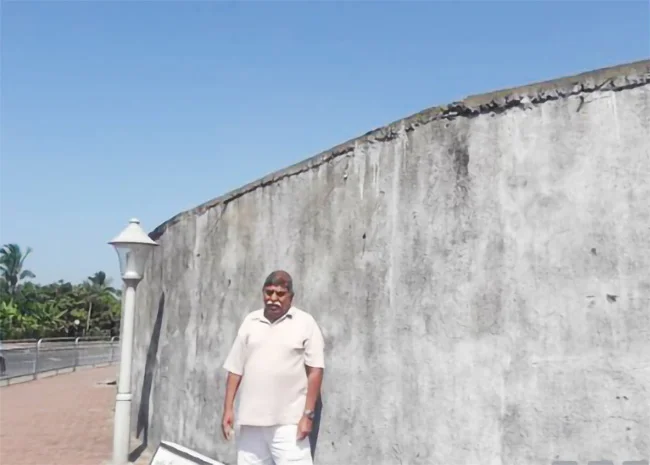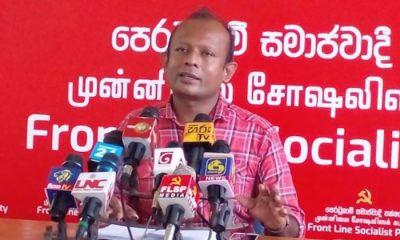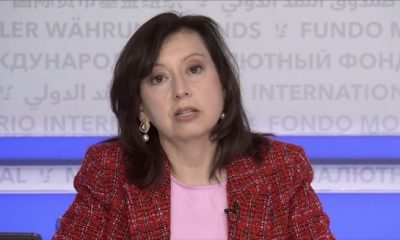Opinion
IMF checkmates Ranil

President Ranil Wickremasinghe by his own admission during an interview with a journalist in Germany said that politics is a game for him. He boasted that he knows it well. With his vision comes his governance. Desperate Sri Lankans experience it on a daily basis. Quite contrary to his cheap vision, the IMF insists throughout its Governance Diagnostic Assessment report issued in the end of September, 2023 that politics and governance is not a cheap game but a process that supports for sound fiscal planning which sets the foundation of effective control of public funds ensuring transparency, minimising risks of corruption at every level, prevents breaching fiscal rules, ensure political stability with proper democratic process to face severe economic, social and governance challenges. None of these is a game.
But Ranil plays a game. IMF indirectly explains how he does it. Corrupt budgeting process is the beginning of his game. Let me give you an example. The government allocates funds from the budget for conducting elections. This budget is approved by parliament too. Then the secretary of the Ministry of Finance goes to courts and insists that there are not enough funds for holding elections. How can this be possible? IMF’s answer is the corrupt budgeting practice. But it is written in IMF’s technical language.
Kindly read carefully. IMF explains that “an effective budget process supports sound fiscal planning and sets the foundation for effective control as well as transparency. To enable sound fiscal planning, the budget should be based on a medium-term fiscal framework that is informed by reliable forecasts and analysis of risk. The budget should comprehensively cover all of the general government sector to ensure full transparency of fiscal planning and other policy interventions. The budget should be prepared through a defined, transparent and timely process to respect the authority of Parliament to approve the budget and to hold budget entities to account for use of resources. Deviations from those principles increase bad fiscal governance and corruption risks.” (Page 56, subsection 125, Sri Lanka Governance Diagnostic Assessment, IMF, Sept. 2023. The word in italic in the above quote is inserted by the author of this article).
What does this mean? It says that if the budget is prepared to cover the government sector to ensure transparency respecting the authority of parliament to approve it, the election commission being a budget entity has to account for use of allocated resources. This did not happen. In other words, the secretary of the Ministry of Finance literally tells the court that the government’s budget process does not support sound fiscal planning and does not set the foundation for effective control and transparency. That’s why the treasury does not have funds to hold elections. This led to the political game of not holding elections.
IMF has noticed it. In its Governance Diagnostic report, the IMF says that among many other reasons for popular discontent, the postponement of local government elections has been a source of popular discontent.” (Page 11).
IMF further insists that “Corruption risks emerge when the budget is not credible. Risks are generated if the executive arm of government is able to spend in excess of budget limits. In such conditions, projects and activities can be funded without due consideration of costs and benefits, and without external scrutiny and oversight by the Parliament.” A recent case was that a few member parliamentarians had gone to New York for the U.N. General Assembly. Nobody knows how their expenditure got covered.
Other bad repercussions of this practice are explained by IMF as follows. “Where there is consistent overestimation of revenue, this typically results in pressure being applied to enhance revenue collections via administrative actions, which can result in deviations from tax policy and collection procedures, creating an environment conducive to subjective actions by tax assessors that raises corruption risk. Where expenditure allocations in the budget are not aligned with underlying cost structures this results in the need for administrative level adjustments during budget execution, where associated approval requirements create a corruption risk. In addition, unrealistic expenditure plans in budgets can create situations whereby payments are rationed by the executive due to a lack of liquidity, creating a situation in which suppliers are required or encouraged to offer bribes in order to have their payments prioritised.” The message is clear. IMF wants proper procedure in budgeting and use allocated funds by budget entities.
IMF has checkmated executive branch by preventing another bad practice. It says there exists a range of funds outside of the Consolidated Fund, and they are not covered by the budget. The budget, therefore, provides incomplete information on the use of all public funds, fiscal policy setting, and equally incomplete transparency regarding public revenue and spending. The risk of corruption is exacerbated as off-budget funds are typically not subject to standard internal control procedures, have limited transparency and do not receive the same level of external oversight as applied to budget entities. The IMF’s message is to stop this game of having funds outside the Consolidated Fund.
Similarly, IMF’s Governance Diagnostic Assessment has revealed systematic and severe governance weaknesses and corruption vulnerabilities across state functions that have broader macroeconomic impact. IMF demands that they be fixed forthwith.
IMF is of the view that “regular civil society participation in oversight and monitoring of government actions is restricted by limited transparency, the lack of platforms for inclusive and participatory governance, and by broad application of counter-terrorism rules.” (Page 11, GDA report). Indirectly, all these mean that Ranil’s style of suppressive governance is a scam if not a game.
Hema Senanayake
hemasenanayake@yahoo.com
Opinion
Ratmalana: An international airport without modern navigational and landing aids

History
In 1934 the State Council of Ceylon decided that an airport with easy access to Colombo was a necessity and declared that Ratmalana was the best site available. Accordingly, an airfield was built, and the first landing took place on 27 November 1935 at what became Ceylon’s first dedicated aircraft landing ground. During World War II the airport expanded, and a ‘hard’ runway was built.
To assist aircraft landing in bad weather and resulting bad visibility, a transmitter was built at Talangama to generate a radio signal beam, called a ‘radio range’, directed along the extended centreline of the Ratmalana runway. If the aircraft was tracking along the correct path, pilots would hear a continuous tone in their headsets. However, if they were left of the desired track, they would hear the letter ‘A’ transmitted in Morse Code (‘dit-dah’); or if right of the beam, the Morse letter ‘N’ (‘dah-dit’). The objective was to hear a continuous signal guiding them toward Ratmalana along the extended centreline of the runway.
Later, a low-frequency Non-Directional Radio Beacon (NDB) transmitter was installed at Attidiya in the vicinity of the airport, and used in conjunction with an Automatic Direction Finder (ADF) onboard the aircraft. A needle on a compass dial in the aircraft pointed to Attidiya, giving directional guidance. Although this system was useful, when most needed, for example during thunderstorm activity, there was static interference and the needles pointed toward the storm instead of at Attidiya. So, a Very High Frequency Omni Directional Radio Range (VOR) was installed for more accuracy and reliability.
After WW2 Ratmalana Airport was served by a few international airlines such as Air Ceylon, Indian Airlines, BOAC (British Overseas Airways Corporation) and TWA (Trans World Airlines). But in 1968 the airport lost its ‘international’ status when Bandaranaike International Airport opened and all international operations moved to Katunayake. Subsequently, the equipment at Ratmalana was allowed to deteriorate; radio navigational let-down aids were no longer operative, and there was no proper control tower. The civil training aircraft of the government’s flying school had neither radios nor radio aids to navigation.
Even the runway lights didn’t work, and domestic flights had to depend on kerosene lamps to demarcate the runway limits. Flares from oil lamps were the guiding light for all traffic landing at Ratmalana Airport. One redeeming grace, in the night, in those days, was that the Sapugaskanda Oil Refinery was in full production and a giant flare of the burning gasses was the guiding light to all domestic traffic landing at the Ratmalana Airport. The Pilots spotted the flare from far away and flew over the Refinery and then turned on the runway heading and could see the runway edge kerosene flares, flickering dimly in a dark patch that was the Ratmalana airport!
Post-1977 and the Dharmista government, another problem was created for Ratmalana operations. Sri Lanka’s capital was moved to Sri Jayewardenepura, Kotte, and a new Parliament complex built there. Unfortunately, the parliamentary precinct was only 3.6 nautical miles (NM) from the end of the Ratmalana runway ‘as the crow flies’, and less than 1 NM from the Talangama transmitters. In most countries overflying the Parliament is prohibited, and Sri Lanka decreed it wouldn’t be an exception to the rule.
This decision was detrimental to freedom of aircraft movements to the Ratmalana runway, preventing longer, safer, conventional landing approaches. At the time Air Ceylon, the Sri Lanka Air Force (SLAF) and other domestic flights were still using Ratmalana airport. Many professionals observed that it was akin to someone building a house near an existing railway line and then complaining that it was too noisy and requiring the railway to divert. This is not unlike the widely-known ‘NIMBY’ phenomenon: Not In My Back Yard.
Consequently, aviators had to accept the non-availability of precision navigational aids at Ratmalana as the Talangama transmitters lost their significance. The Urban Development Authority (UDA) eventually took vacant possession of the Talangama precinct, and the Sri Lanka Army’s Gemunu Watch infantry regiment established a camp there.
During December’s clear nights and cooler mornings, temperature inversions combined with the northeasterly winds blowing smoke from the Sapugaskanda Oil Refinery seriously compromise visibility on the final approach to Ratmalana airport. (See image 1)
On the morning of 14 December 2014, a SLAF Antonov An-32 transport aircraft on a ferry flight from Katunayake attempted to approach for landing at Ratmalana airport and crashed. This prompted the then Air Force Commander to write to the then Director General of Civil Aviation (DGCA) to reinstall navigational facilities (see letter below). Now, after almost 11 years, Airport and Aviation Sri Lanka (AASL) is slowly realising that not only the ‘seen’ but also ‘unseen’ facilities at Ratmalana should be brought up to international standard in the name of air safety. Wide publicity was given to the fact that the government’s intention was to make Ratmalana an international business aircraft hub by way of regaining its past importance. In fact, it is now known as the Colombo International Airport Ratmalana (CIAR). (See image 2)

Image 2
Meanwhile, another security-sensitive building has been erected and commissioned on vacant land at the former site of the Talangama transmitters, barely 1 NM from the Parliament and 4.4 NM from the Ratmalana runway end. That is the Akuregoda Military Head Quarters, which has created an effective manmade barrier to limit operation of legitimate air traffic to Ratmalana, consequently imposing more restrictions on inbound operations. Furthermore, it appears that there was no ‘master plan’ for Ratmalana International Airport, in a case of the left hand not knowing what the right hand was doing. (See image 3)

Air safety dictates that jet aircraft should have at least an 8 mile straight-in (no turns) final approach. Now it is not possible to do that with the unplanned presence of sensitive buildings on the final approach to Ratmalana. Ideally, as in other countries, all three parties – the local municipality town planner; Civil Aviation Authority/ Airport and Aviation Ltd (CAASL/ AASL); and building developer – must make these long-term decisions. In Australia, for instance, the Civil Aviation Safety Authority and relevant airports authorities have control of manmade obstacles for a radius of 25 miles. In Sri Lanka, unplanned buildings, called ‘man-made relief’ as against ‘geographic relief’ (terrain), have compromised feasibility of the intended city airport.
Another example is the General Sir John Kotelawala Defence University (KDU), the tallest building in the vicinity of Ratmalana Airport that should never have been allowed to be built that high. This is symptomatic of a malady the entire country is suffering from: people in the know are afraid to speak up. Subsequently, no one is held accountable for these poor, uncoordinated decisions without true professionals being consulted, resulting in tunnel vision. As a pithy Sinhala saying goes, “ledaa malath, bada suddai” (‘although the patient died, the bowels were clean’).
Accommodating ‘business jets’ (‘bizjets’, or executive jets) at Ratmalana Airport will be a good source of revenue, and a step in the right direction. Putting aside criticism of how Ratmalana Airport was allowed to run down, I write to offer a practical solution to mitigate the adverse effects of unplanned buildings. While the Akuregoda military base is working around the clock, the overflying prohibition may be justified. But Parliament sits only on certain days and for limited hours.
Therefore, the authorities should provisionally allow air traffic, inbound to Ratmalana, to overfly the Parliament complex on days and times when there are no sittings. A Notice to Airmen (NOTAM) to that effect could be issued as and when necessary.
The over-flight of the Parliament would become ‘Restricted Airspace’, not ‘Prohibited Airspace’. With airspace thus shared for the benefit of all users, longer and therefore safer approaches could be designed to facilitate those small but fast bizjets from overseas operating in and out of Ratmalana Airport.
The differences in airspace regulation and restrictions are as published by the International Civil Aviation Organisation (ICAO).
Restricted Area/Airspace is defined as an area of airspace where flight is permitted only under certain conditions. These conditions may include obtaining permission from the airspace’s controlling authority, flying at a certain altitude, or following a specific route. Restricted airspace is typically used for military training, testing, or other activities that require special precautions.
A restricted area is an airspace of defined dimensions above the land areas or territorial waters of a state, within which the flight of aircraft is restricted in accordance with specific conditions. (ICAO Annex 2: Rules of the Air)
Prohibited Area/Airspace is an area of airspace where flight is completely prohibited. This type of airspace is typically established for national security reasons, such as protecting sensitive government facilities or military bases. In some cases, prohibited airspace may also be established for safety reasons, such as around airports or other areas with high levels of air traffic.
A prohibited area is an airspace of defined dimensions, above the land area or territorial waters of a state, within which the flight of aircraft is prohibited. (ICAO Annex 2: Rules of the Air)
Furthermore, Ratmalana Airport lacks a proper Control Tower with a 360-degree range of visibility of the airport area. It is time to ‘think out of the box’. A new Control Tower could be sited in the highest point in the vicinity. Perhaps at the KDU building to mitigate the situation. At Wellington Airport, serving the capital of New Zealand, the control tower is on top of a shopping mall! (See image 4)

Image 4: Wellington Airport, New Zealand, control tower above a shopping Mall
A, research shows that light training aircraft and other small aircraft of the size and mass of business jets cannot create catastrophic destruction to strong buildings such as our Parliament or the Akuregoda military base, similar to what happened on September 11, 2001 in the USA with large passenger jets. (See image 5)

The Current Status at Colombo International Airport Ratmalana.
A map of Ratmalana Airport with heights of significant obstacles. The height above Mean Sea Level (MSL) is the first figure. The height above the airport reference point is within brackets. Note: The KDU is 212 ft. above MSL, standing at a height of 190ft. (See image 5)
Although publicised as an ‘international airport’, Ratmalana does not even have a ground-based precision electronic navigation or landing aid such as a Very high Frequency (VHF) Omnidirectional Radio range (VOR) or an Instrument Landing System (ILS). An excuse for that lack is that unplanned buildings such as the Sri Lanka Air Force Museum are obstructing navigational signals. Even if ground-based radio navigational aids are not available, modern satellite-based navigational aids such as a Global Positioning System (GPS) could be used.
India has already launched satellites into space and positioned a Geo-Augmented Navigation (‘GAGAN’) satellite for GPS navigation over this part of the world. Unfortunately, Sri Lanka has failed to request India to share use of the system. In the above map ‘RM’ (top left) is the NDB situated at Attidiya, and is not aligned with the extended centreline of the existing runway.
The Ratmalana terminal building was built in the likeness of many ‘colonial’ airports in the 1950s. It was often used for international movie backdrops. Unfortunately, the airport administration demolished parts of this historic terminal to accommodate an ugly temporary structure.
There is still no air traffic control tower conforming to international standards with a 360-degree view. From the building that is being used, air traffic control officers cannot see the south side of the airport and the runway at the Galle Road end.

The author (5ft 6in tall) beside the controversial hazardous wall at Colombo International Airport, Ratmalana
Speaking of the Galle Road end, there is still that concrete (or cement brick) wall which is considered a hazard by all experienced pilots, yet the authorities continue to ignore demands for its removal. To clarify, a hazard, according to EASA (European Union Aviation Safety Agency), is “a condition or an object with the potential to cause or contribute to an aircraft incident or accident.”
The EASA goes on to state that one way of identifying a ‘hazard’ is accepting the opinion of experts with professional knowledge. Accordingly, 22 very experienced pilots with experience totalling 330,500 hours petitioned the then Director of Civil Aviation to remove the concrete wall at Colombo International Airport Ratmalana and replace it with a frangible fence. The letter is produced below.
2nd November ‘18
The Director General,
Civil Aviation Authority,
Minuwangoda Road,
Katunayake.
Dear Sir,
The Concrete Wall at the Galle Road End at the Ratmalana Airport
Attached herewith is a petition signed by 22 very experienced pilots, who feel strongly about the presence of the concrete wall at the Galle Road end of the Ratmalana Airport.
The petitioners have a total of 330,500 hours and consist of a cross-section of some of the most experienced pilots in the land.
It is hoped that you will heed their call and at least get the process going.
Thanking you in anticipation.
Yours truly,
Capt. G A Fernando
The author (5ft 6in tall) beside the controversial hazardous wall at Colombo International Airport, Ratmalana
But the airport authorities couldn’t care less. I believe that the main reason for this sad situation is that none of the present airport administrators are or have been aviators.
“If you think that Air Safety is expensive, try an accident” Jerome Lederer, President, Flight Safety Foundation, USA
gafplane@sltnet.lk
The Writer is Immediate past President, Aircraft Owners and Operators Association (AOAOA)
RCyAF/ SLAF, Air Ceylon, Air Lanka, Singapore Airlines (SIA), SriLankan Airlines
President, Colombo Flying Club.
President, UL Club (an Association of Former Air Lanka and SriLankan Airlines Employees)
Life Member of the Organisations of Professional Associations (OPA)
by Capt G A Fernando
MBA (UK)
Opinion
Understanding what GSP+ means for Sri Lanka:

By now, the term GSP+ has become almost a household word in Sri Lanka. As the European Union’s GSP scheme’s current cycle is set to expire by the end of 2023 and the new cycle for the next ten years (2024–2033) is about to begin, Naveera Perera, the Research and Publications Manager (Internal) of the Moot Court Bench International Trade Law Program, interviews Gomi Senadhira, an expert in International Trade Policy who, among other key roles, has held the positions of, Director General of Commerce of Sri Lanka, Sri Lanka’s Permanent Representative of the World Trade Organisation (2004-2006), the Chair of the WTO Committee on Trade and Development (2005), Minister of Commercial and Economic Affairs at the Sri Lanka Mission to the European Commission in Brussels (2001-2004), and the Commonwealth Senior Advisor for Trade Policy and Negotiations to the Government of the Seychelles (2013-2015), to discuss what GSP and GSP+ are and has subsequently meant for Sri Lanka. This article was originally published on Moot Court Bench International Trade Law Program Website
Compiled by Naveera Perera
Q: What does the term ‘GSP’ mean?
A: “GSP” is an abbreviation of “Generalised System of Preferences”. It is one of the most important tools in global trade policy to support the economic development of developing countries through international trade. However, to understand what it really means and its legal status, it is necessary to understand another important international trade term: MFN, the Most Favoured Nation principle. The MFN is the most important principle in multilateral trade law, as embodied in Article 1.1 of the General Agreement on Tariffs and Trade (GATT). It requires all members of the GATT (now the WTO) to be treated in the same manner in terms of market access. In other words, the best tariffs or non-tariff conditions extended by any member of the GATT to any other country have to be automatically and unconditionally extended to every other member of the GATT. The only possible exceptions are Free Trade Agreements, which are covered under Article XXIV of the GATT. Thus, even if a developed country wanted to give trade/tariff concessions to a developing country, it was not possible to do so without extending it to all other members of the GATT.
At the time when GATT was negotiated, a few preferential systems existed between developed and developing countries. These included, among others, the Commonwealth preferences and preferential trade arrangements between France and her former colonies. Therefore, attempts were made to find a way to use preferential trade as a tool of international development policy at the United Nations. This was deliberated at the first session of the United Nations Conference on Trade and Development (UNCTAD I) in 1964. Then in 1968, the second session of UNCTAD adopted a resolution to establish a system of generalised, nonreciprocal and non-discriminatory preferential tariffs system in favour of developing countries. This is what is known as the Generalised System of Preferences (GSP).
Subsequently, the necessary legal cover was provided by the GATT: first through a temporary waiver for GSP from Article 1 obligation and then the Enabling Clause (which became an integral part of the GATT). Under these decisions, “Notwithstanding the MFN obligation under Article 1.1, developed countries can extend developing countries more preferential tariffs in a generalised, nonreciprocal and non-discriminatory manner”. With the approval of these waivers, developed countries could establish autonomous GSP schemes, according to its own regulations, whilst staying true to its basic principles, that is, “preferential tariffs for developing countries in a generalised, nonreciprocal and non-discriminatory manner”.
Q: How does GSP relate to EU-Sri Lanka Trade Relations?
A: The first to launch a GSP scheme was EEC (EU). When this was done in 1971, it was extended to all developing countries in a generalised, nonreciprocal, and non-discriminatory manner. However, the EEC also continued with the trade preferences for some of their former colonies in Africa, the Caribbean, and the Pacific (ACP preferences). The ACP preferences included broader product coverage and deeper preference margins (mostly duty-free) than what was provided under the GSP preferences. The Asian and Latin American (former) colonies were left out of this enhanced preferential arrangement. So, from the very beginning, Sri Lanka and other Asian developing countries were not getting MFN in the European market.
Q: Then why didn’t Sri Lanka and/or other Asian countries challenge that in the GATT?
A: To challenge that, Sri Lanka had to go against not only the EEC but also against other developing countries. That was the early stages of the Non-Alignment Movement and the Group of 77 (G77). Perhaps, at that stage, the cohesiveness of developing countries was much more important to us than market access, particularly because Sri Lanka’s development policies at the time were not export-oriented. We were inward-looking, concentrating more on import substitution. Possibly due to these reasons, Sri Lanka did not make much effort to obtain ACP-like preferences in the European Market. Instead, we were more focused on becoming the leaders of the G77 and the Non-Alignment Movement.
On the other hand, Andean, and Central American Countries (some of these countries are also loosely called “Banana Republics”) started lobbying at every possible point for ACP-like preferences in the European market. We do not have much literature on this, but available reports show the intensity of their lobbying. For example, during the official tour of these countries by Mrs. Rosalynn Carter, the US First Lady, in 1977, the main message the Presidents of Costa Rica and Colombia wanted her to take back to the US president on their behalf was to gain his assistance in getting ACP-type preferential market access to the EEC whilst receiving a similar arrangement for them in the US market.
After 10 years of consistent lobbying by Andean and Central American Countries, in 1990, the EU came up with a bizarre kind of GSP arrangement called “GSP Drugs” or the GSP “Special arrangements to combat drugs production and trafficking”. This facility was extended only to the Andean and Central American Countries. Some of these countries were among the top coca-producing countries in the world. Most of them exported bananas, cut flowers and other tropical products. The concessions under “GSP Drugs” were very similar to the concessions under ACP and provided duty-free treatment for most of the products. Only a few items, like bananas, were left out.
In the early 1990s, Sri Lanka and the Asian Group took this up at UNCTAD very strongly. We argued that “GSP Drugs” violates the non-discrimination principle of the GSP and pointed out that it should be either aborted or extended to all preference-receiving countries. The EEC defended it under the Enabling Clause. Though the EEC position was incorrect, no one wanted to challenge this in the GATT dispute settlement system, as it was weak and expensive, and the decisions were not effectively enforceable.
A few years later, in 1999, the EU introduced two other special GSP arrangements. These were; GSP Labour and GSP Environment. Additional tariff concessions were available under these arrangements, and these were open to all beneficiary countries under certain conditions. Subsequently, the EC introduced another GSP arrangement specifically for Least Developed Countries (LDCs) called “Everything But Arms (EBA)”. In addition to that, the EU also had developed a few other trade arrangements, like Euro-Med Agreements, under which some developing countries received deeper preferential tariffs.
Q: What other countries in South Asia raised similar concerns? Did any one of them succeed in getting ACP-like preferences?
A: Bangladesh, Nepal, the Maldives, and Bhutan received duty-free access to the EU market under EBA. Then after 9/11, the EU extended “GSP Drugs” to Pakistan. So overnight, Pakistan also got duty-free market access to the EU. Though India didn’t get ACP- like preferences, it was the second largest beneficiary (after China) of the GSP arrangements. Sri Lanka could not even fully benefit from GSP general arrangement due to very strict and complex “Rules of Origin” requirements, and Sri Lanka’s GSP utilisation ratio was below 50%. As a result, at the beginning of this century, Sri Lanka was seriously marginalised in the EU market and was paying the highest average tariff rate.
Q: You mentioned that Sri Lanka held a strong position against the Commission, arguing that we were being discriminated against. Could you elaborate on that?
A: To give you some context, in the year 2000, the WTO appointed a group of “Eight Wise Men” to study and clarify the challenges the multilateral trading system faced. This group was chaired by Peter Sutherland, the first WTO Director General and the former Commissioner of the European Commission in charge of Competition Policy and consisted of very eminent people (one of the eight men was John Howard Jackson – the John H Jackson Moot Court Competition is named after him). This committee submitted a report (‘The Future of the WTO,’ published in 2004) where they noted:
“At the heart of GATT was the principle of non-discrimination characterised by the MFN clause and the national treatment provisions principally embodied in Article 1. The MFN Clause was regarded as the central organising rule of GATT and the world trading system of rules it constituted [para 58] …. Yet, nearly five decades after the founding of GATT, MFN is no longer the rule; it is almost the exception… Certainly, the term might now be better defined as LFN, a Least Favoured-Nation treatment [para 60] …. This is best illustrated by reference to the EU, which now has the MFN tariff fully applicable to only nine trading partners, albeit including the US and Japan. All other trading partners are granted concessional market access under Article XXIV, the Enabling Clause, GSP schemes, “Everything but Arms”, and other relationships [para 74].
Around the same time, the discrimination Sri Lanka faced in the EU market was highlighted in a research undertaken by Oxfam/UK (‘Running into Sand’, published in 2003 by Oxfam). On page 28, they noted: “The available evidence suggests that the EU’s Common External Tariff (CET) is fundamentally anti-poor. Here too, the principle of perverse graduation applies. In Britain, tax rates on imports of goods from India are around four times higher than for the USA, rising to over eight times higher for countries such as Sri Lanka and Uruguay.”
While the above publications proved a point in favour of Sri Lanka’s claims, before these studies were published, the Sri Lanka Mission to the EC in Brussels directly took it up with the Commission in 2002. Our arguments were based on our own studies.
Perhaps, 2002 also marked the start of a new chapter in EU-Sri Lanka trade relations. The South Asia division in the Commission’s Trade Directorate was only established that year. Prior to that, South Asia and South America were handled by the same section. Within that section, South America comparatively received more focus, barely providing much attention to “South Asia” as a region. India had a strong presence in Brussels and better access to the commission. So, on a one-on-one basis, India managed to negotiate her concerns with the EC. By then, India was the second largest beneficiary of the EU GSP Scheme. The South Asian LDCs managed access through the LDC track and, by 2001, had full duty-free market access to the EU under GSP-EBA. Pakistan also had received duty-free market access, purely due to political reasons, under “GSP Drugs”.
At the very first meeting we had with the new South Asia section, we made a strong representation of the marginalisation of Sri Lanka due to the EU’s discriminatory trade policies. Around the same time, then-Prime Minister Ranil Wickremesinghe visited Brussels and also took this up with the Commission. At the end of a prolonged process over a few months, the EC agreed to have a joint study through one of its think tanks and also funded it. The Joint study largely came with the same conclusions as our original study, although theirs was a bit watered down. While this was going on, the commission suggested that Sri Lanka apply for GSP Labour to get additional duty concessions. So, we went on to apply for it, and we were the first developing country to get the GSP Labour. However, even with the GSP Labour, we were very much marginalised in the EU due to GSP rules of origin, which were loaded against small countries like Sri Lanka.
Q: So, where does GSP Plus (GSP+) come in, and how is that different from the previous GSP scheme?
A: In December 2001, Thailand became the first country to start a case (EC – GSP Drugs) in the WTO dispute settlement system. They followed the relevant procedure, first requesting a consultation and a panel. However, the dispute did not progress beyond the consultation phase, and the panel was not established. Presumably, Thailand and the EU may have possibly come into an agreement during the consultation process and decided not to move forward with the case. This is not unusual within the WTO dispute settlement system.
After the GSP Drugs facility was extended to Pakistan, in March 2002 India challenged the EU GSP scheme at the WTO. India argued that the tariff preferences accorded by the EC under the special arrangements nullified or impaired the benefits accruing to India under the most favoured nation provisions of Article I:1 of the GATT and the relevant paragraphs of the Enabling Clause. The WTO Panel decision in December 2003 and the Appellate Body decision in April 2004 agreed with the main points of the Indian submission.
In fact, the WTO ruling on the India – EU GSP case confirmed what Sri Lanka has been advocating for more than ten years. That is, EU preferential arrangements nullified or impaired the benefits that should have accrued to Sri Lanka under the MFN provisions of the GATT and the relevant paragraphs in the Enabling Clause.
Subsequent to the WTO Appellate Body Decision, the EU launched a renewed GSP scheme in April 2005. The new scheme contained, instead of five arrangements of the previous scheme (General, “Drugs”, Labour, Environment, and EBA), only three arrangements. It continued with the general arrangement and EBA, but “Drugs”, Labour and Environment arrangements were combined to form a new arrangement called “GSP+”. The GSP+ introduced a few additional conditions. The potential beneficiaries of the arrangement were the beneficiary countries of the “GSP Drugs” arrangement (other than Pakistan) and the countries that were receiving GSP Labour or were in the final stages of qualifying for GSP Labour. Under the arrangement, subject to the Rules of Origin, the beneficiary countries received duty-free market access for most of their exports.
However, it is important to understand that the “GSP+” does not provide Sri Lanka with a major competitive advantage over most of our competitors, as they had similar or better access into the EU market under the arrangements like ACP, “GSP Drugs”, or EBA. It only offered Sri Lanka a level playing field in the European Market after thirty years of being denied something which was rightfully ours.
At the same time, it is also necessary to point out that the EU extended the GSP+ facility to Sri Lanka at a very crucial juncture of our trade relations. Prior to 2005, the tariffs did not impact much on our garment exports to the EU because those were covered by the quota arrangement. However, after 2005, it was different. The cheapest source secured the market, and 9% to 12% duty made a difference. So, after 2005, GSP+ helped our apparel exporters to remain competitive in the EU market.
Moreover, it is also necessary to point out that Sri Lanka’s GSP utilisation rate still remains relatively low, at 63%. In other words, only 63% of preference-eligible exports receive preferential tariffs, whereas 97% of preference-eligible exports from Pakistan and Bangladesh receive preferential tariffs. As a result, as illustrated in the GSP Hub portal of the European Commission, only 54% of Sri Lanka exports get preferential GSP tariffs (as against 86% for Pakistan and 97% for Bangladesh). That means even with the GSP+, nearly half of Sri Lanka’s exports are under the MFN (or what the Sutherland Report called LFN – Least Favoured-Nation) tariffs.
Q: Recently, there has been much contention about the European Parliament (EP) resolutions that have threatened the position of Sri Lanka and other countries’ participation within the GSP+ Scheme. What are your thoughts on that?
A: In June 2021, the European Parliament (EP) adopted a resolution urging the commission “….to use the GSP+ as a leverage to push for advancement on Sri Lanka’s human rights obligations and demand the repeal or replacement of the PTA, to carefully assess whether there is sufficient reason, as a last resort, to initiate a procedure for the temporary withdrawal of Sri Lanka’s GSP+ status….”. Before that, the EP had adopted similar resolutions on Pakistan and the Philippines.
After the EP adopted the resolution on Sri Lanka, to put things into perspective, I wrote an article to compare the resolution on Sri Lanka with the resolutions on the Philippines and Pakistan. In that article, I pointed out that the EP resolutions on Pakistan and the Philippines called on the Commission to take immediate action to withdraw the concessions, and interestingly, the language used in the resolution on Sri Lanka was milder.
Although the EP may pass a resolution, it should be noted that the enforcement of the resolution is the responsibility of the commission. When it came to Sri Lanka, it appears that the commission had opted for a more cautious approach. Take the case of the Philippines – the wording used in the resolution was more immediate, implying that no alternate form or tool could be used against the country. An important point in this respect is that, to date, no action has been taken. The Pakistan resolution was also similarly strongly worded, and yet nothing has happened. In contrast, in the case of Sri Lanka, GSP+ was said to be removed “as a last resort” if the government did not address the concerns raised on the PTA.
It is also necessary to emphasise that the use or misuse of the PTA directly and adversely impacts people in Sri Lanka. Similarly, the issues related to human rights or labour standards are matters that have a direct impact on the citizens of the country. Therefore, the people in this country are more interested than the Commission in solving such issues. If GSP+ is removed or not extended on the claim that human rights or labour standards are not enforced properly, the EU would only penalise them, the victims. As of now, the Commission has much more forceful tools at its disposal to penalise those who violate the basic rights of the people. Therefore, the withdrawal of the GSP+ status from Sri Lanka only is considered “a last resort” after exhausting all other options. Similarly, I believe the Commission would adopt a more cautious approach as it reviews the GSP Plus eligibility for the next cycle.
Opinion
Elected President does not own the state

I refer to the editorial of The Island, dated 24.04 2025, under the title ‘Good governance: Pie in the sky?’ and the article of Dr. Upul Wijayawardhana in The Island dated 23.04.2025, titled ‘The sea change after Modi’s visit,’ on similar subjects. They urge the government to disclose the contents of the MoUs signed with India during Indian Prime Minister Narendra Modi’s recent Sri Lanka visit.
We remember how the UNP leader J.R. Jayewardene (JRJ) signed the Indo-Lanka Pact in 1987 amidst a curfew, disregarding widespread opposition to the treacherous agreement, its repercussions. Later, the Constitution was amended to accommodate what India wanted JRJ to do. Fortunately, no government has yet devolved the police and land powers, as per the said agreement, based on ethnic lines. If fully implemented, it will be irreversible and, if an attempt is made to reverse them, the consequences will be disastrous.
Similarly, a ceasefire agreement crafted by the Norwegians, and signed by the UNP leader Ranil Wickremesinghe and LTTE leader
V. Prabhakaran, in 2002, was not transparent and didn’t serve Sri Lanka’s interests. Unless this foolish agreement had been abrogated and the LTTE defeated, the situation would have been totally different.
We also remember how the JVP leaders took on those governments for signing the above agreements. The JVP’s reign of terror destroyed thousands of lives and state assets worth billions of rupees in the late 1980s, as rightly mentioned in the aforementioned editorial.
The public elects the country’s President and MPs for a specific period. They have no right to commit the country to long-term agreements that are detrimental to the country in many ways.
Sangadasa Akurugoda
-

 Opinion5 days ago
Opinion5 days agoRemembering Dr. Samuel Mathew: A Heart that Healed Countless Lives
-

 Business3 days ago
Business3 days agoAitken Spence Travels continues its leadership as the only Travelife-Certified DMC in Sri Lanka
-

 Business3 days ago
Business3 days agoLinearSix and InsureMO® expand partnership
-

 Latest News2 days ago
Latest News2 days agoNPP win Maharagama Urban Council
-

 Features5 days ago
Features5 days agoTrump’s economic missiles are boomeranging
-

 Latest News5 days ago
Latest News5 days agoThe Heat index is likely to increase up to ‘Caution level’ at some places in Eastern, Northern, North-central and North-western provinces and in Monaragala and Hambantota districts.
-

 Business2 days ago
Business2 days agoNDB Bank partners with Bishop’s College to launch NDB Pixel awareness
-

 Sports2 days ago
Sports2 days agoDamsiluni, Buwindu win Under 14 tennis titles
























